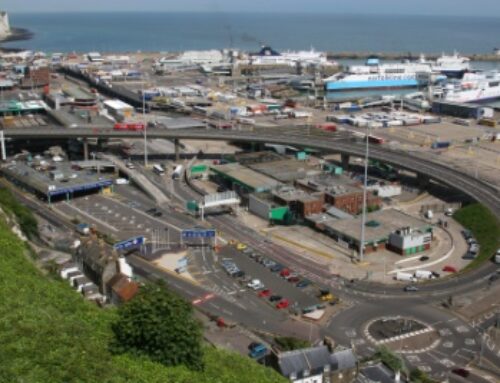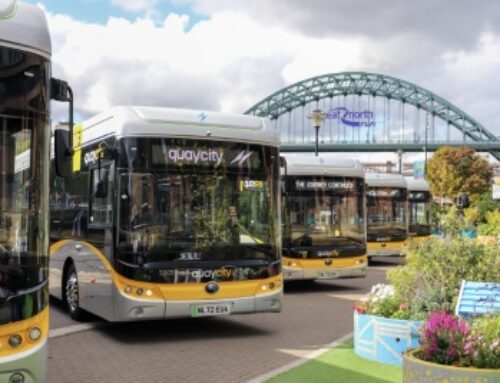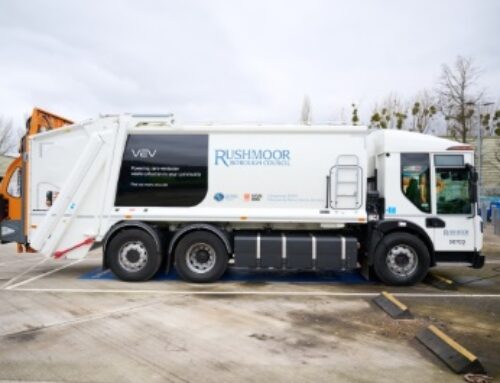MPs call for national network of LEZs
 A recent debate in the House of Commons saw Members of Parliament discuss the potential for establishing further low emission zones (LEZs), similar to the one currently in operation in Greater London, across the UK.
A recent debate in the House of Commons saw Members of Parliament discuss the potential for establishing further low emission zones (LEZs), similar to the one currently in operation in Greater London, across the UK.
Ben Howlett, Conservative MP for Bath, opened the debate by urging the government to introduce a standardised set of regulations for the establishment of new LEZs.
“In layman’s terms, I want to see an off-the-shelf LEZ system that can be picked up from government and dropped into a community such as Bath in a much easier way than is currently the case,” he said.
“With the European Court of Justice’s deadline for a proposal on how we can bring Britain’s air quality up to legal standards almost upon us, we need to look at the introduction of LEZs and how they can be implemented as quickly and successfully as possible.”
Citing his own constituency as an example of how urban centres were suffering from “dangerously high levels of air pollution”, Howlett said Bath residents’ associations supported his call for an LEZ in the city.
“A study in Bath showed that road traffic contributes a staggering 92 per cent of the total nitrogen oxides (NOx) concentration, with heavy-duty vehicles contributing between 24 per cent and 57.1 per cent of that,” he said.
“Those figures are promising in that they show that a restriction on the movement of vehicles through central Bath will reduce the contribution that traffic makes to pollution levels in the city.”
He added that London’s LEZ provided “a brilliant starting point for a national strategy”, and also referred to examples of schemes that had launched in Oxford and Brighton.
“The technology currently exists for the police and/or local authorities to prevent high polluting vehicles from accessing built-up areas,” said Howlett. “The problem really rests in the inability of councils to enforce vehicle access. We need to find a way to enable local authorities to do that.”
Jim Shannon, transport spokesperson for Northern Ireland’s Democratic Unionist Party, welcomed the rollout of LEZs as an aim, and said they could “achieve real results of implemented properly.”
But he added that MPs should be “very cognisant” of the potential financial costs of action on the issue, and “mindful of the potential unintended consequences.”
Shannon asked whether LEZs might negatively affect economic activity, particularly that of small and medium-sized enterprises (SMEs).
“Large businesses will be able to replace vehicles that fall short of the targets with relative ease compared with SMEs, and local, indigenous businesses will be hit hard if they are hindered in their ability to operate as a result of the introduction of LEZs,” he said – pointing out that Northern Ireland had: “the largest number of small and medium-sized businesses, which could be directly affected.”
“Perhaps we could alleviate concerns by introducing an exemption system or some sort of assistance for SMEs, particularly indigenous businesses,” he suggested.
Labour shadow environment minister Nick Smith spoke in favour of a national network of LEZs.
“Air pollution-related conditions cause thousands of premature deaths in this country every year,” he pointed out. “Children growing up around severe air pollution are five times more likely to have poor lung development, and long-term exposure leads to an increased risk of lung cancer and heart disease.”
But he added that the problem required “national oversight and guidance,” and could not simply be passed to local authorities to deal with without adequate support from central government.
“A few years ago, the government gifted themselves the power to pass such penalties on to local authorities in areas of high air pollution,” said Smith.
“At the same time, those local authorities faced deep cuts to their budgets… The buck is being passed without the real power to fix the problems being identified. While the government’s approach relies on devolving obligation and accountability to local authorities, it does so without providing any additional resources or the tools for the job.”
Concluding the debate on behalf of the government, the environment minister Rory Stewart said simplicity would be the key to standardising LEZ regulations, and highlighted a consultation recently undertaken by the Department for Environment, Food & Rural Affairs.
“Can we produce a standardised system of low emission zones to be rolled out across the cities? Yes, of course we can. The point of our consultation is to provide four straightforward models of what low emission zones—what we call clean air zones—can look like.
“The first model deals with buses and taxis; the second with buses, taxis and heavy goods vehicles; the third with buses, taxis, HGVs and light goods vehicles; and the fourth one goes all the way down to cars.
“The objective is for an HGV driver to know that the same rules apply throughout England or, ideally, if we can work with the devolved administrations, throughout the United Kingdom, so that we do not have different rules in different places,” he said.
“In essence, because the LEZs would be standard, provided that HGV drivers had a Euro 6 diesel engine in their lorry, for example, they would know that they could enter any of the zones anywhere in the country, as such vehicles would be exempt. We do not want to end up with a situation in which any individual business has no idea what is happening when it turns up somewhere.”
Stewart said the government would aim to produce a plan by the end of the year, once analysis of consultation feedback was complete.











